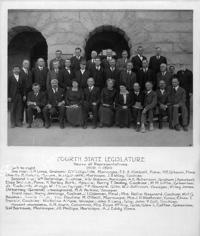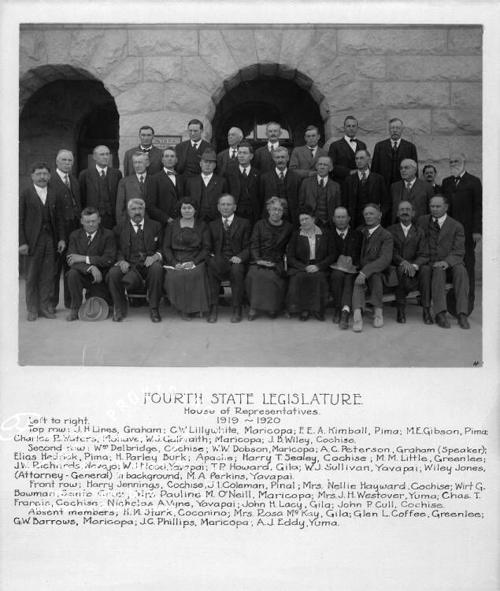Most Arizonans mistakenly believe the song “I Love You Arizona,” composed and performed by Willcox native Rex Allen Jr., is the state anthem.
However, the state’s official ballad, “Arizona,” was written by Margaret Rowe Clifford in 1915 and adopted by the Fourth Arizona State Legislature as the state anthem in 1919 — all due to the efforts of Nellie Abbott Hayward, Cochise County representative to the Arizona House of Representatives, one of the state’s first female legislators.
Born Dec. 2, 1872, in Elgin, Illinois, Elenore Agnes “Nellie” Abbott was the first of nine children born to Lydia and Civil War veteran Abraham Abbott. After high school, she attended business classes until marrying journalist Jeriah Bonham at age 18. Nellie’s only child, daughter Beatrice, was born the following year.
Jeriah moved his family to Oakland, California, working as a streetcar conductor. Nellie joined the entertainment world as a singer and actress. By 1902, the couple were in Arizona. They divorced in Coconino County.
Three years later, Nellie married railroad conductor Jason Hayward in El Paso. When the railroad relocated Jason to Douglas, Nellie found work as a stenographer for Cochise County. She became a charter member of the YWCA, joined the Douglas Chamber of Commerce, and was active in the Episcopal church.
Daughter Beatrice, having acquired her mother’s singing voice, took over as the family entertainer by performing in local church productions until her untimely death from typhoid fever at age 13.
By 1915 Nellie and Jason were living in Phoenix with Nellie serving as Arizona House of Representatives roll clerk. Fluent in Spanish, she was soon translating for the Legislature and in 1918, she became assistant chief clerk of the House, the first woman in the country to be employed in the position.
That same year, she represented Arizona at the National Women’s Suffrage convention in San Francisco.
Encouraged to run for office, Nellie won a position as a state representative from Cochise County. She served on the House enrolling and engrossing committee that proofreads amended measures as well as preparing and delivering bills to the governor for consideration. She eventually chaired the committee.
The following year, Nellie was successful in passing the bill to have the song “Arizona” adopted as the state anthem.
At the same time, she was working to convince Gov. Thomas Campbell to ratify the 19th Amendment to the U.S. Constitution. “Arizona was a leader for suffrage,” Nellie remarked, “and I desire to see the state act promptly now.”
The “Hayward Resolution” supporting the 19th Amendment was introduced to the Legislature by Nellie and the three other female state representatives: Pauline O’Neill, Rose McKay and Anna Westover. It passed unanimously.
Serving as state chair of the National American Woman Suffrage Association as well as the National Woman’s Party, Nellie threw her hat in the ring as a delegate for Arizona Secretary of State in 1920. Of the four Democratic candidates, she came in second.
Shortly after her defeat, Nellie and Jason divorced.
In 1923, she became assistant secretary of the state Senate and continued to work in state agencies for the next 40 years. She remained active with the Democratic party along with her participation in the Phoenix Women’s Club and the Arizona Federation of Women’s Clubs.
In 1929 Nellie owned a house about 5 miles northwest of Phoenix and rented out rooms. In March, she and one of her renters were arrested and charged with maintaining a still in the garage. The garage also contained 70 gallons of rye whiskey and twelve 53-gallon barrels of mash. Nellie claimed no knowledge of the distillery or its operation.
According to an article in the Arizona Daily Star, “Mrs. Nellie A. Hayward, stenographer in the office of the secretary of state, was at liberty under a $5,000 bond today, after having been indicted by the federal grand jury on the charge of possession of a still designed for the manufacture of intoxicants.”
The renter eventually pled guilty to the charges, and Nellie’s name was not mentioned again in connection with the indictment.
In the 1930s, Nellie became interested in Psychiana, a religious movement started by Frank B. Robinson, an Idaho pharmacist. Classed as part of the “New Thought” movement, Robinson promoted spiritual healing along with physical and material wealth. His mainly mail-order religion offered bi-weekly lessons by subscription. Nellie became one of his most ardent followers. In a 1932 letter to Robinson, she said she was on her 4th lesson and credited his teachings with an overall improvement in her being. “I am really not the same person,” she wrote. “I am better mentally, physically and spiritually—better in every way.”
Nellie married for a third time in 1935 to Phoenix chiropractor Ishmael Ircadia but the marriage only lasted a couple of years.
At age 91, Nellie was honored by a group of Democratic women for her contributions serving in the state House of Representatives and her efforts to ratify the suffrage bill. “I was one of the first legislators to wear petticoats,” she said. I was here before Barry Goldwater.”
Recognizing her efforts to have the song “Arizona” endorsed as the state anthem, she signed copies of the sheet music at the event.
Nellie died Oct. 22, 1971 at the age of 97. “To her goes credit for most of the work in drafting the joint resolution of the Arizona House asking Congress to amend the U.S. Constitution to grant suffrage to women,” wrote one reporter.
Nellie led an energetic, productive life. As often as she fell short of her goals, whether it was in her personal choices or during her numerous years in the Legislature, she eagerly sought other avenues to accomplish her dreams and objectives.





